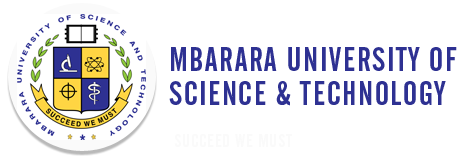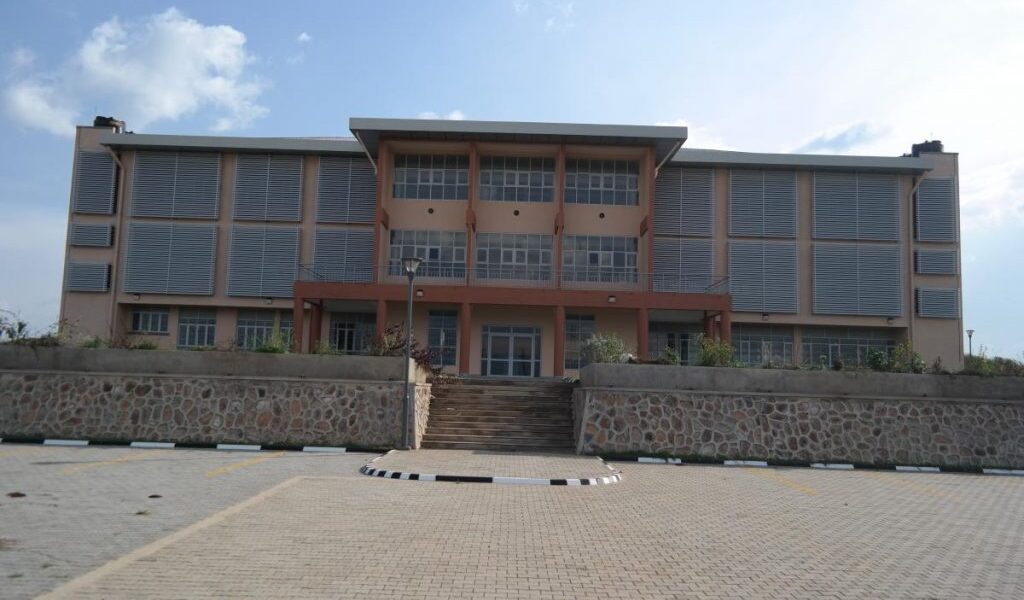BACKGROUND OF MUST LIBRARY, ITS SECTIONS AND SERVICES
Mbarara University library started in 1989 with the founding of Mbarara University of Science and Technology in its core functions of teaching, learning, and research through the provision of information resources and services. The library started from a humble beginning with the library building which would only house forty stacks with a book stock of five thousand five hundred fifty (5550) volumes most of which were donations. The sitting capacity was seventy three (73) seats; there were no proper working area and offices. There were four (4) members of staff manning it.
Background
With the increasing number of library users resulting from yearly student in-take and the annual book stock, the University was faced with the challenge of expanding the existing library structure. Fortunately through the Government funding and fundraising from well-wishers a storeyed library building was commissioned by His Excellency Yoweri Museveni in 1998. By 2001 the building was completed and functioning. This is in manifestation of fifth law of Library Science as stated by Dr Ranganathan (1891) who is referred to as the “Father.” of Librarianship that a “Library is a growing organism.”
Today the library has a collection of over 85,000 monographs with annual addition of about 2800 textbooks and subscribes to electronic information resources such as; e- databases of scholarly journals, CD-ROM, among others. There is also a book bank system with a collection of basic textbooks for the taught courses. It has a sitting capacity of 700 readers, but still there is need to extend the existing library building to create more reading space for the increasing number of students and staff.
However, in the meantime departmental libraries have been established e.g. Pharmacy, IITR, Management Science, among others to minimize the challenge of space shortage. There are 9 qualified members of staff i.e. 2 holding Masters, 2 Bachelors, 2 Diplomas, and 3 Certificates in Library and information studies
In long term, the University has secured money from African Development Bank (ADB) to construct a 1,500 seater library at the new site at Kihumuro. The architectural design is in place and construction work is expected to start early next year (2015). According to the plan the library structure is expected to provide enough reading space, space for shelves and stacks, seminar rooms, offices, technical room, Archive, among others. This will also come with its challenges but we shall cross the bridge when we reach it.
Mission
MUST library draws its strength in terms of information resources from being a member of the Consortium of Uganda University libraries, who negotiates for low cost electronic information resources, such as international databases, e-books, and scholarly on-line journal articles covering various subjects. This has enhanced access to up – to date peer reviewed literature. Today a total no. of 90 computers is connected to internet. The library collection is accessed through on-line public access catalogue (OPAC) locally designed and KOHA library management system in which data entry is ongoing.
The University library has local and International development partners such as Lund University, Cornell University, British library, among others. This partnership has enhanced service delivery through services like electronic document delivery where documents that are not available in the library are obtained from our partner libraries. The library has donor support such as SIDA –SAREC, Book Aid International (BAI) and American Embassy-Uganda among others.
However, there are challenges and threats which the library is facing and will continue to face but service delivery must continue. SUCCEED WE MUST
Vision:
A centre of excellence in provision of information services for the advancement of knowledge.
Mission Statement:
The Mission of Mbarara University Library is to support and supplement the teaching and research activities of the University through provision of information and other services.
CORE VALUES
- Transparency
- Excellence
- Integrity
- Efficiency
- Accountability
OBJECTIVES
1. To select and acquire the best and affordable current seminal world thought to support the diversified academic and professional fields offered by the University and provide general support to national development.
2. To effectively process, preserve, provide access to and/or disseminate information available in the house or through international databases and inter-library loans.
3. To foster a caring and supportive environment in which service to customers is paramount.
Library – Services
Services in this section are provided as follows:
Quick reference:
These are general queries which require quick reference Assistance, using standard “Ready reference tools such as Directories, Almanacs, Encyclopedias, Dictionaries, etc.
Search type questions:
These require assistance in the use of catalogues and electronic resources such as the CD-ROMs, electronic journals and general Internet access.
Selective Dissemination of Information (SDI):
Faculty members and students who have indicated their teaching and research profiles are individually provided with a list of newly acquired materials and information deemed useful for their teaching and research needs.
Inter – Library Loans (ILL)
ILL enables the academic faculties, students and other members to borrow researched materials not available in MUST Library, from the sister libraries of the consortium of University Libraries in Uganda. The members of the consortium are:
- Makerere University Library
- Kyambogo University Library
- Uganda Christian University Library
- Uganda Martyrs University Library
- Nkumba University Library
- Bugema University Library
- Gulu University, to mention a few
International Affiliation
Lund University Sweden
American Embassy– KAMPALA
The American Educational Advising Center (MUST)
The Public Affair Section (PAS) of the U.S. Embassy in Kampala entered into a partnership with MUST Library. The partnership was an effort to help U.S. Embassy (PAS) to expand its range of educational advising services to South-Western region. So this led to the creation of Educational Advising satellite center at MUST. The center helps students who previously had to travel to Kampala in order to access information on Study in the United States.
If you want to study in United States, the American Educational Advising Center will HELP YOU:
Understand the American system of education
Have access to U.S. University and College guides
Access test preparation materials
Have access to Internet to research on American Universities and Colleges
Identify and select the right program and institution
Work out a proper application time line
Register for standardized testing
Fill out the application forms
Prepare yourself to go …. Thanks to the Pre-departure Orientation Sessions
There are currently five major sections of the Library, which provide services to Students and Staff to ensure that the quality of teaching and learning as high a physically possible.
Library- Circulation Section
The circulation section has the following Functions and Services:
- Registration of Library users
- Issuing borrowing cards
- Lending and Receiving books
- Book reservation
- Current awareness
- User education
Information/Help desk
Learning Center
The learning centre was established in August 2004 through the collaboration between Lund University, Sweden and MUST, Uganda. After the winding up of the collaboration/project, the management of the centre was handed over to the library and it has become one of the sections of the library to generate income for the university.
Activities for income generation
- Internet subscription
- Photocopying
- Printing and spiral binding
- Laminating
- Scanning
OTHER E-SERVICES INCLUDE:
- Instructions on how to access electronic journals
- Information search skills training
- Usernames and Passwords to databases MUST Library Subscribes to
- Guidance on research literature review
- Guidance on how to use reference management software (Endnote)
Library- Periodicals Section
The Periodicals Section is located on the ground floor and the collection includes the following:
- Serials
- Journals (print versions)
- Magazines
- Newspapers
- Reports
- Abstracts and indexes
Periodical literature is not loaned-out in most cases; it is read within the Library. However, it can be lent out for at least two days if a user shows a need.
Library- Reference Section
The Purpose of Reference Section and Information services are:
- To develop and maintain an up-to-date, relevant and readily accessible reference collection.
- To meet the general information needs of the Library clientele, notably students and Faculty members.
Library- Short Loan Section
This section has collections of books, which are on high demand and are lent for a short period of time to be used within the Library. The collection consists of textbooks for undergraduate and postgraduate studies based on recommendations of the academic staff and departments.
The Library Book Bank Section
This is a section where books are lent out to users for a long period of time usually a whole term/semester.
Objectives:
- To ensure availability of basic textbooks to students against limited funds.
- To develop a system capable of sustaining University education system amidst students’ inability to buy/acquire correct textbooks.
- To promote effective sharing of books/resources among students.
- To effectively utilize the limited reading materials in the section.
- To develop students ability to handle property loaned to them.
- Suggestion Box
Library – LibHub Online Journals
A first-of-its-kind online workspace for researchers and students is now available through MUST Library and Consortium of Uganda University Libraries (CUUL) at libhub.sempertool.dk
Kiox began with the idea that researchers and students should have instant access to the most up to date resources available. Less time waiting for web pages to load or drudging through millions of resources to find that one article, and more time discovering, discussing, creating, sharing, and applying new knowledge.
It covers all the journals, articles, e-books,and database links previously accessed through Research for Life (HINARI,AGORA,and OARE), all databases paid for through INASP/Peri arrangements and open access resources for the academic community. The link can be found here research4life.org
The features are very easy to use; e.g. you can carry out simple search and advanced search and get full-text articles. You can also browse to see if what you are looking for is available, after which you can save your hits in your collection. However, you will need to go through a simple registration process to create a folder for your collection.
Kiox is an evolving resource that will continue to improve based on user feedback, new applications, and new technology. I therefore urge you all to take advantage of this useful tool to ease your research and also encourage colleagues and students to make use of the tool.
Please feel free to contact me, Wilson Adriko, at MUST Library, e-mail wadriko@must.ac.ug /
Additional electronic resources:
A complete listing of all electronic resources available at MUST can be found here.
For websites that are password-protected, please enquire at the library for the password.

